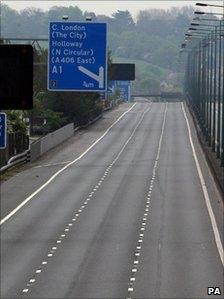CBI warns government of threats to inward investment
- Published

The CBI called for "greater resilience" in UK infrastructure
The UK's position as a good place to invest is being threatened by regulation and planning constraints, industry leaders have warned.
With competition for international inward investment now so fierce, the government must remove "stumbling blocks", the CBI employers' group said.
It added that foreign investment fell "significantly" during the recession between 2007 and 2009.
It wants more apprenticeships and a fast-track planning system.
Tax cuts
"Time isn't on our side and we have less than five years to turn things around," warned CBI director general John Cridland in presenting a on how to make the UK economy more attractive.
"We want the UK to be the best place for companies to invest because this is how we will create growth and jobs.
"But it is worrying how many business leaders are telling us that the UK no longer holds the same attraction it once did, and are questioning whether they need to be here at all."
He called on the government to "completely transform the investment landscape... With competition for international capital so fierce, the government must play up our strengths and remove the stumbling blocks to investment".
Tax cuts were a major element of the changes called for by the industry body, including the further reduction of corporation tax to 18% and the abolition of the 50 pence income tax band.
Also among the CBI's recommendations were that the government should:
open up more public services to private provision
accelerate the transition to a low-carbon economy
speed up the regulatory process for clinical drug trials
support further business-led academies and apprenticeships
build greater resilience into the UK's infrastructure, particularly better broadband
create fast-track processes for planning.
Several heads of UK companies lent their support to the report, which was based on a survey of 400 firms across the country.
"Our investment decisions are taken with a long-term view, so stability of government commitment is important," said Andreas Goss, head of German engineering firm Siemens in the UK, who was critical of the lack of engineering and science skills in the country.